PROVINCETOWN — All 14 articles on the warrant passed at the special town meeting on Oct. 23, including a $2-million purchase of land for new housing on Nelson Avenue and two measures to regulate short-term rentals.
Nelson Avenue
TOWN MEETING
Monday’s Provincetown Warrant: Heavy on Housing
A land purchase and two short-term rental regulations lead the agenda
PROVINCETOWN — There will be 14 articles in the town meeting booklet on Monday, Oct. 23, but only a few of them are likely to provoke much discussion at town hall that evening.
A $2-million land purchase on Nelson Avenue is the reason the meeting was called, as the expenditure must be authorized by town meeting voters for the purchase to proceed.
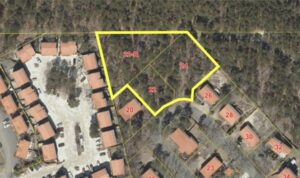
Alongside it on the warrant are two short-term rental regulations, a ban on “fractional ownership” of homes, a liberalization of accessory dwelling unit rules, and three articles that help move forward plans for housing on town-owned land at 3 Jerome Smith Road, 26 Shank Painter Road, and 288A Bradford St.
The land purchase was announced on July 24, when the select board approved a negotiated price of $2.035 million for three adjacent parcels: 22 Nelson, 22R Nelson, and 24 Nelson. Together, the parcels amount to nine-tenths of an acre.
Developer Tom Tannariello had gone through 13 months of meetings to secure permits for 12 residential condominium units at 22 and 22R Nelson Ave. under the town’s inclusionary bylaw. Ten of the units would have been sold at market rate, while two would have been affordable-ownership units.
The planning board approved that project in January, but Tannariello put the properties on the market in April anyway.
With 24 Nelson Ave. included, the properties could currently support 18 units, according to Town Manager Alex Morse. But once the town’s sewer system is expanded to include Nelson Avenue, the switch from density rules based on septic systems to those for sewered areas would allow for 48 to 60 units, Morse said.
“Securing the land is undoubtedly in the Town’s best interest,” reads the official explanation for Article 8 on the warrant. “Without the Town’s intervention, the likelihood of private development looms large, leading to a proliferation of market-rate condominiums, many of which could potentially become short-term rentals.”
When Tannariello’s project was before the planning board, critics argued that the 10 market-rate condos would likely become short-term rentals, and that two affordable units were not sufficient to make the project worthwhile.
Morse argued, however, that the town’s density formulas clearly permitted the project and that failing to approve it would be a sign that the planning board could not actually implement the inclusionary bylaw it had sought.
With Tannariello’s change in plans, however, if the town now buys the land, all the units that are built there will likely be deed-restricted in one way or another, either as affordable rentals or affordable ownership units, perhaps with a new kind of restriction copied from Vail, Colo. that town meeting voters endorsed this spring.
Short-Term Rental Rules
Articles 11 and 12 would create a bylaw to regulate short-term rentals in two specific ways: by preventing corporate ownership of short-term rental properties and by limiting short-term rental certificates to two per person.
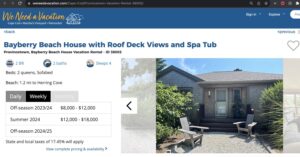
Under Article 11, trusts, S corporations, and LLCs could still hold short-term rental certificates, but they would have to have all their human owners named on documents at town hall.
Article 12 would limit each person to holding only two short-term rental certificates. Both articles would “grandfather in” existing short-term rentals, even if they are currently corporate-owned or are held by someone with more than two.
In spring 2022, the Independent examined the state Dept. of Revenue’s list of properties in Provincetown that had paid short-term rental taxes at any time between July 2019, when the tax went into effect, and February 2022.
Eighty percent of the properties on the list were held by people who had only one short-term rental; 128 properties were held by people who had two properties on the short-term rental list.
There were 13 owners at that time who had three properties on the list, five owners who had four, two owners who had five, and one who had six. That means 75 short-term rental properties at that time would have been affected if Article 12 had been in place then.
Some of those properties have been sold since then — for instance, the owner of five short-term rental properties above Way Downtown and Tin Pan Alley, across from town hall, sold all her holdings to two different buyers this year.
Other buyers have made bulk purchases of property, however.
In January, a company called Puck’s Folly LLC sold a half-acre parking lot in Cambridge for $9.4 million. It subsequently bought a $2.9-million house on Martha’s Vineyard and three Provincetown properties in March and April.
The historic Martin House at 157 Commercial St. was purchased for $2.8 million on March 9, a two-bedroom house at 101 Bayberry Ave. was purchased for $1.9 million on April 3, and a one-bedroom condo, 6 Mechanic St. Unit B, was purchased for $665,000 on April 11. All four properties are now short-term rentals.
The two-bedroom at 101 Bayberry rents for $12,000 to $18,000 a week on weneedavacation.com, and the five-bedroom Martin House, formerly a restaurant and then a single-family home, rents for $15,800 to $21,000 a week in summer on its own website.
These are the kind of bulk corporate purchases that select board members have said are not yet common here but that they would like to prevent. “It would be nice to be ahead of the curve for once,” select board chair Dave Abramson said at a housing workshop in June.
Fractional Ownership and ADUs
Article 13, a ban on fractional ownership of properties, is another trend that the town would like to get ahead of. Select board member Leslie Sandberg brought up the subject in the spring, saying that housing advocates on Martha’s Vineyard have been alarmed to see fractional ownership deals beginning to appear in the market there.
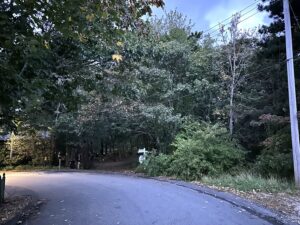
Sandberg recused herself from voting on Article 13 when the select board made its final endorsements on Oct 10, however. “I voted to recuse myself because of a client that I have, and I’m not sure where they stand on fractional ownership,” Sandberg said. “I do not want to appear to tip the scales either way.”
Sandberg, who is a partner in and owner of the communications firm Rose, Sandberg, and Associates, told the Independent that the client in question is the Cape Cod and Islands Association of Realtors.
Article 14 would remove existing year-round restrictions on the use of new accessory dwelling units and add two looser ones: a ban on short-term rentals in ADUs and a prohibition on splitting ADUs off into condominiums. The town has produced only one new ADU under its current bylaw, and participants in the housing workshop argued that looser rules might encourage more.
Abramson voted against Article 14 on Oct. 10, while the rest of the board endorsed it.
Town meeting will start at 6 p.m. on Monday, Oct. 23 at town hall. Voters who have missed the last several elections may have been marked “inactive” in the town’s voter rolls and should bring identification with them for voter check-in.
HOUSING
Provincetown Takes Two Steps Toward Building More Housing
Select board endorses 40 units on Shank Painter and a land purchase on Nelson Ave.
PROVINCETOWN — The select board took two votes on July 24 that put the town on course to create up to 100 new apartments at two locations — one on Shank Painter Road and the other on Nelson Avenue.
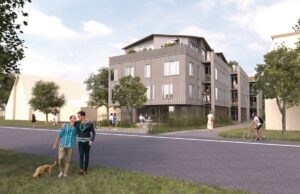
The first vote was to award Christine Barker and M. Tatiana Eck and their respective companies a contract to redevelop the former police station site at 26 Shank Painter Road into 40 market-rate apartments.
The town asked for proposals for market-rate apartments at that site in April, and Barker and Eck, working with architect Jeffry Burchard, filed the only response. Their proposal includes the transfer of 26 Shank Painter and the adjacent parking lot at 15 Browne Street to them for $500, a potential $4-million contribution from the town, and the development of 40 apartments that would be restricted to market-rate year-round rental occupancy only.
“The town would convey the property with a deed restriction that all units must remain as year-round rentals,” Town Manager Alex Morse wrote in a memo to the select board recommending the contract.
The contract does not itself convey the property or spend any money. “The conveyance of the property does not occur until a project is permitted, financed, and ready to break ground,” Morse wrote in the memo.
The vote to purchase three adjacent parcels on Nelson Avenue — numbers 22, 22R, and 24 with a total area of .91 acres — came at the end of the meeting, after a brief interval in executive session. The first two parcels will cost $1,270,000, while the third one will be $765,000, for a combined total of $2,035,000.
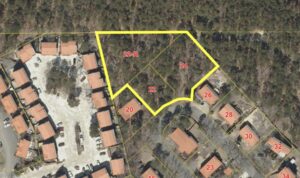
Developer Tom Tannariello had spent 13 months securing permits to build 10 market-rate condos and two affordable-ownership condos at 22 and 22R Nelson. He was awarded his final permits in January but put the properties on the market in April.
Combined, the three parcels have an allowed density of 18 units, Morse wrote to the select board. But once the town’s sewer system has expanded to serve Nelson Avenue, sometime between 2027 and 2030, the parcel could support from 48 to 60 units, he wrote.
“While the town does not have immediate plans for redevelopment of these parcels, securing this land is in the town’s best interests,” Morse wrote.
“The vast majority of units in any privately-owned plan would be market-rate condos,” Morse wrote, “many of which would be eligible to be short-term rented.” By purchasing the Nelson Avenue property, the town is “positioning itself to have the assets needed to provide affordable, community, and workforce housing in the long term,” Morse wrote.
The select board’s vote to endorse the purchase and sale agreement was unanimous. The purchase would have to be approved by voters at a fall town meeting, which is tentatively scheduled for Monday, Oct. 23.
Market-Rate Apartments
The 40 apartments that Barker and Eck propose to build would be the first deed-restricted market-rate rentals the town has commissioned without state or federal support.
Similar construction projects, such as the apartments at Province Landing at 90 Shank Painter Road, have all been deed-restricted for people making less than 80 percent of the county’s median income in order to capture federal and state funding for affordable housing.
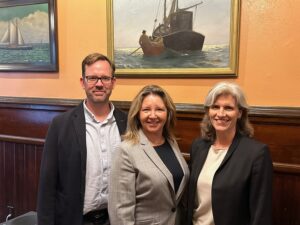
The Harbor Hill timeshare complex on Bradford Street Extension was purchased with town funds and rehabilitated into 28 market-rate apartments, but building market-rate apartments from scratch has not been attempted on the Outer Cape in many years.
The town had issued a request for proposals that specifically sought developers who would not use state and federal funding in order to ensure that the units could be inhabited by people who earn 80 percent of area median income or more.
Barker and Eck asked for a 10-year abatement of local property taxes alongside the $4-million town contribution. In his memo to the select board, Morse wrote, “While the discussion regarding the town’s financial contribution can be decided at a future time, the review committee feels the initial request does not seem unreasonable given the lack of financial subsidies” from other layers of government.
Barker and Eck’s apartment building would include 32 units with no income restrictions on the occupants and 8 units with an income restriction from 80 percent to 150 percent of area median income. In dollar terms, that would be $67,700 to $126,975 per year for a single person, or $77,400 to $145,125 for a couple.
They propose to rent 18 studio apartments at $1,675 to $2,000 per month, 18 one-bedroom apartments at $2,500 to $2,750 a month, and four two-bedroom apartments for $3,000 a month.
Their partners on the proposal include Burchard, the architect from Machado Silvetti who designed the Provincetown Art Association and Museum’s building at 460 Commercial, and John Ciluzzi, owner of Premier Commercial Real Estate, which will manage the apartments.
The building uses a new zoning bylaw, passed at town meeting in 2022, that allows four-story residential buildings in the town’s General Commercial zone, which runs along Shank Painter Road and the northern end of Conwell Street. Burchard’s design steps back the fourth story by wrapping it with balconies and steps back part of the first story that faces Commercial Street as well.
The parcels on which it would sit amount to only 0.4 acres and wrap around an existing three-story building at 30 Shank Painter Road that comprises eight residential condominium units. There would be no onsite parking at the property, although there are 27 town-owned paid parking spaces across the street at the fire station.
The entire project is projected to cost $13.3 million, or $333,000 per apartment.
Select board members praised the presentation and then voted for it unanimously.
“I was on the RFP review committee,” said select board member Erik Borg, “and my major takeaways were that it’s a creative and well-designed solution on a strange plot of land, and it serves a demographic in town where we have a gap.”
“When the town issued this RFP, we weren’t sure what we were going to get back,” said select board member Austin Miller. “I think what we see here in terms of unit count, design, and thoughtfulness of the proposal is really solid work.”
DEVELOPMENT
12 New Condos Proposed for Nelson Avenue
2 units would be affordable under Provincetown's inclusionary bylaw
PROVINCETOWN — Local developer Thomas Tannariello wants to build 12 condominium units on a .58-acre lot on Nelson Avenue. Two units would be deed-restricted as affordable dwellings.
Tannariello’s company, Tri-T, plans to build using the town’s inclusionary and incentive zoning bylaw, enacted by voters in 2017 to encourage developers to contribute to Provincetown’s supply of affordable housing.
“Given that any development of affordable housing is normally a 10-year-long process,” said Michelle Jarusiewicz, Provincetown’s community housing specialist, “the bylaw has given the town a speedy and cost-effective way to add to the affordable housing mix.”
The bylaw allows for greater density than would otherwise be permitted in exchange for the inclusion of affordable housing. Projects permitted under the rule must have 16 percent of their total units deed-restricted as affordable; otherwise, the developer must pay into a fund for affordable housing.
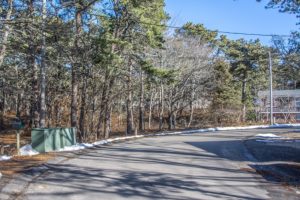
The developer’s plans go through an extensive review process and must receive a special permit from the planning board.
With the board’s hearing on the proposal less than a month away, some neighbors are already voicing concerns about parking and density.
The project proposed for 22-22R Nelson Ave. meets all the bylaw’s dimensional requirements for setbacks and lot coverage. Tannariello will need a special permit under the general bylaw for site plan review for an increase of three or more residential units on one lot. An additional special permit will be required since he proposes more than six buildings. Tannariello has applied for 12 one-bedroom units with basements in seven two-story buildings. Five buildings would have two units each and two buildings would house freestanding units.
The hearing on the plan was scheduled for Feb. 10 but was delayed to March 10 at Tannariello’s request.
The planning board has received several letters in opposition.
The plan calls for 15 parking spaces, which exceeds the town’s requirement of 12, but neighbors say it’s still not enough.
“Existing multi-unit dwellings with limited off-street parking have resulted in a surplus of vehicles lining both sides of the street,” wrote Michael Gaucher, who lives at 20 Nelson Ave., in a letter to the board.
Gaucher also objected to one unit’s patio being 80 feet away from his deck.
Keryn (Beth) O’Donnell lives across the street from the site. She asked the planning board to consider decreasing the number of units from 12 to seven, with two of those being affordable.
“This level of density will irrevocably change the character of this quiet neighborhood,” wrote O’Donnell.
There were other concerns over drainage and the addition of septic systems in an area that is not currently on a sewer line. Neighbors also objected to trees being cut down.
But not all letters were critical.
“Not only will this provide much needed housing, but also provide a couple of affordable units,” wrote Gregory Gundling of 6B Nelson Ave.
Brian Bator, a year-round resident of 16 Nelson Ave., gave his enthusiastic endorsement to Tannariello’s proposal, writing it will “bring new vitality to our neighborhood.”
Other projects that have been approved under the inclusionary bylaw include two at 30 Shank Painter Road, one at Harbor Hill, and two at 286A Bradford St., according to Town Planner Thaddeus Soule.
A total of three others are in the permitting stages now, said Jarusiewicz. One of them is a seven-unit proposal for 50 Nelson Ave. by Dol-Fin LLC, whose principal is Maria Cirino. It includes one affordable unit onsite and a payment for a second that would be built elsewhere. That project has stirred little opposition. Her buildings will be set at the end of a long driveway off the street.
